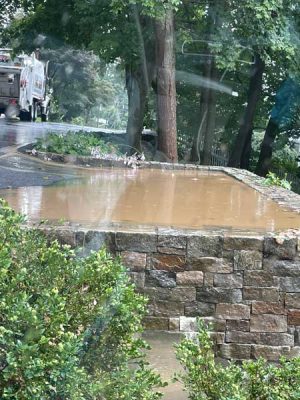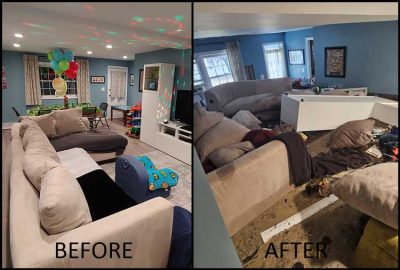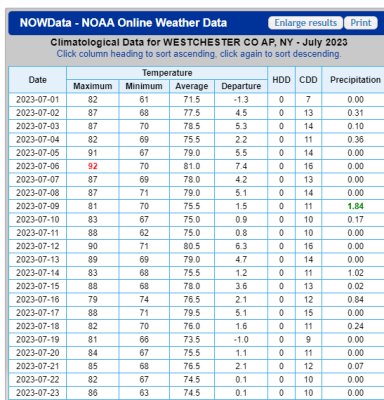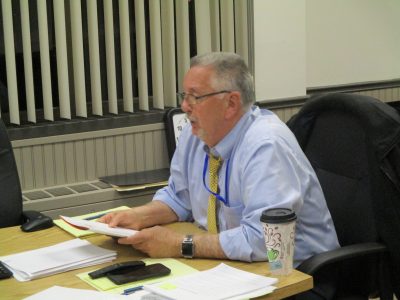‘Erin Brockovich’ of Mount Pleasant Spotlights Town’s Flooding Woes
Opinion Advocates for ideas and draws conclusions based on the author/producer’s interpretation of facts and data.
By Adam Stone
Michael Farruggia displays emotion in this brief video from July 18, 2023, the day of his most recent massive flood.
One lesson I’ve learned as both the husband of a teacher and the publisher of local civic news is to never underestimate the organizing and debating prowess of a local mom on a mission, especially when that mom is schooled in the fact-based accountability culture of education.
Thornwood’s Anna Nelson, as assistant principal at an innovative public school in the South Bronx and the mother of an almost three-year-old, is the type of smart, diligent, prepared citizen whom local leaders dismiss at their own political peril.
The San Antonio, Texas native, and her husband, William Nelson, are among the scores of town residents grappling with flooding issues in their homes.
She moved to Mount Pleasant about seven years ago, after spending her first decade in New York living in Harlem and Queens.

“I just feel really passionate about it because my husband said he doesn’t plan on moving anytime soon,” said the Warren Avenue resident, who as recently as Saturday morning complained of a soaked front and backyard, and images of residents pumping out their basements, rivers of water flowing out of neighbors’ retaining walls after the latest rainfall.
“Even driving along Commerce Street this morning there were huge pools of water by Risotto Restaurant and a drain right there, but water was not flowing in it,” Nelson observed. “What’s the point of having a drain if the water is not directed to flow into it?”
With more nearby development looming, the issues will only worsen in time, she frets.
“We can ignore it for now because maybe it’s just like an inch of water in our basement or a couple of inches of water,” Nelson said. “It’s not that bad, but it’s going to get worse.”
‘Wild’
On July 18, 2023, the date of the big flood in Mount Pleasant, Anna Nelson had left summer school early to get to an appointment.
When she stopped off at home at about noon, a quick rain started. The initial shower ended within about 20 to 30 minutes, just as she was leaving for her appointment.
But, within that narrow window of time, her basement was flooded with stormwater.
“You could see the water coming down my steps,” Nelson said in a Zoom interview last week. “I was like, ‘This is really wild.’”
Nelson sprung into action, playing a pivotal role in galvanizing a community of outraged residents to seek solutions.
‘Rivers of Mud’

She corralled neighbors through a community Facebook page, coordinated a group survey, prepared shareable spreadsheets, gained expert insight from her sister, an engineer, and met with town Supervisor Carl Fulgenzi along with other impacted homeowners to demand change.
The digital spreadsheet, for example, lists the names and contact information from about 40 local households, and the details of their complaints.
“I live directly downhill from a house/property that started construction in 2019 and is still not done,” one resident wrote in a portion of their spreadsheet comments.
The neighbor asserted that the town is entirely “responsible because they approved all these plans.”
“I lived in my house for six years with no issue until they started,” the resident also said in a segment of her remarks. “I get rivers of mud that deposit on my property when it rains.”
Nelson also secured related and revelatory documents through the Freedom of Information Law, better known as FOIL.
So what’s causing the flooding problem?
“There’s so much development happening in the town,” Nelson said in one of our interviews.
It’s a conclusion town officials reject. More on that in a minute.
Reporting Gold
My Examiner column writing colleague, Michael Gold, published a piece on the flooding issue a couple weeks ago but gently pushed me at a recent breakfast at the Pleasantville Diner to inspect further.
“This issue is crying out for an investigation,” Gold said in an earlier e-mail on the topic.
Gold had already chronicled how Mount Pleasant residents confront rising floodwaters and financial burdens, citing recent developments that allegedly amplify stormwater runoff issues.
Yet David Smyth, Mount Pleasant’s town engineer, told Michael that Summit Estates and Kingsview Estates adhered to state regulations.
Increased storm frequency and intensity – exceeding 100-year storm levels – remains the real culprit, Smyth insisted.
But residents interviewed by Gold discussed the inadequacy of existing drainage systems and developers’ responsibilities.
Video taken by Anna Nelson of rain storm (click here)
Anna Nelson captured videos of the storm’s impact on the area surrounding her home.
Wonder No More
Resident Mary Burke, for example, told Gold about the two times she experienced four inches of water in her basement laundry.
It happened first in September 2021, during Hurricane Ida, then again last July.
She spent a combined $65,000 to install a new drainage system and gravel to help stem the stormwater. (The 2021 storm’s impact was severe enough to shut down portions of routes 100 and 120 for repairs.)
With all that recent reporting in mind, I briefly wondered whether there was enough uncovered ground to justify another examination.
I was quickly disabused of any further wondering.
‘Is That Enough?!’

Even though we covered the summer storm at the time, the emotional toll of this story didn’t fully hit me until last week, when I watched a brief and heartbreaking July 18, 2023 video, a record of the rain’s havoc.
A breathless local Hawthorne resident, Michael Farruggia, captured a roaring cascade of water relentlessly pummeling his home in real time, pouring through the street, gushing down his driveway and flooding his Myrtle Avenue home.
“OK!” Farruggia screams, his voice cracking. “Is that enough?! Is that enough?!”
A muddy river of rain water flowed through Commerce Street, bypassed all storm drains and destroyed his garage and finished basement for the second time in two years, Farruggia reported.
Pause and think about that.
Farruggia filed a notice of claim against the town, and is currently in settlement negotiations to address more than $100,000 in related expenses he’s absorbed resulting from required renovations, the loss of a garage and the prospect of future weather threats.
Do the Right Thing
Farruggia has already gotten rid of his garage, spending $10,000, losing value on his house in the process after cementing it off, making it part of the home’s foundation.
“And now I need another 40 grand,” he said. “I got to raise my driveway. I got to completely redo the whole front of my house so that we can never get flooded again.”
Painful as the incident was for his family, I wondered if Farruggia could paint a picture of what transpired.
“So basically, it creates that reservoir in my driveway and then the force of the water when it knocks down that garage door, my basement gets about five feet of water within, I would say within like 60 seconds,” Farruggia explained of the July 18 incident in a phone interview last week. “It came crashing in.”
I asked the supervisor about the Farruggia case when I reached him for an interview late Friday afternoon.
Fulgenzi noted how he can’t comment on the specifics of litigation.
The matter is being handled through the town’s insurance company, he said.
“What would I be if I wasn’t sympathetic to all these people?” Fulgenzi said. “It’s my job to try to find solutions. I’m not a miracle worker, but I do listen and I try to help.”
It’s important to note how Farruggia, his wife Jessica and the couple’s sons do not live in a designated flood zone.
As a result, the couple never purchased flood insurance on the home, which they bought in 2018 for $630,000.
“I just want to break even on all this,” he said. “We’re not asking for [a lot of] money. We’re not retiring. It’s not a million dollars. It will probably barely cover what we’ve put into this.”
Farruggia said the supervisor has expressed sympathy toward his circumstances.
“They know this is bad, especially with my little kids and the volume,” said Farruggia, currently in a relatively dire financial condition from the related expenses. “They know this is not good. And they said they want to do the right thing and settle.”
Unique Case

While other residents might also maintain legal claims against the municipality, Farruggia explained how his family’s circumstances are unique because of an explicit town blunder.
After Hurricane Ida in 2021, the town installed a protective curb. A French drain helped keep flooding away for two years.
But shortly before the July storm last year, as part of road enhancements, the town paved over the protection.
“My wife noticed it, and she started talking to the guys, saying, ‘Hey, look, while this is still literally hot pavement, you need to put that curve back, we need it,’” Farruggia recalled. “The guy’s like, ‘Oh, we can’t do that now. You got to call the town, talk to our boss. We’ll come back later.’”
Before the well-intentioned workers could correct the problem, the rain came.
“So that’s why we’re in a unique situation, because they actively did something,” Farruggia said. “They took away our only line of defense the morning of the storm.”
In fact, it was Nelson’s sister who helped connect the Farruggia family to an engineering firm to bolster his legal case.
“Anna’s been amazing,” Farruggia said.
Human Toll
The impact of the July flood on the community even caught the attention of WABC Eyewitness News, with Mount Pleasant having declared an official state of emergency at the time.
“It was a river coming from down here, and it just built up six to seven feet against my garage door, and the force of it knocked it back and it flooded the garage and my family room,” Farruggia is quoted as saying to Eyewitness News.
Thankfully his two sons were not playing video games in the basement, as per usual, when the incident occurred. Otherwise, the impact of Mount Pleasant’s flooding problems could have spelled doom.
“They’re endangering people’s property value and that sucks or whatever, but it’s going to get to the point because these storms are going to become more frequent and more severe, where they’re actually endangering lives by not handling this kind of stuff,” said Nelson, who also teaches advanced placement U.S. government and politics, as well as economics, at her school, which serves students in grades 6-12.
On Aug. 3, after reviewing some of the documents she obtained through her FOIL request, Nelson e-mailed neighbors about her preliminary findings.
She said she was stunned to discover that the drainage plans for the town actually direct the water to flow into Farruggia’s house, with no catch basin at the end.
WTF

A layman herself, Nelson asked her sister, a civil engineer in Texas currently working on addressing Houston’s water and drainage issues, whether she was interpreting the documents correctly.
Nelson wanted to know if her sister agreed that the town’s infrastructure “seemed to have directed the water to flow directly into this house.”
“To which her professional view as a drainage engineer was, ‘Um, that’s exactly what it shows and what the actual [expletive]’ and that they literally designed it to do that,” Nelson relayed to her neighbors in the Aug. 3 e-mail.
Stephanie Tabor, Nelson’s sister, serves as a project manager at Houston’s A&S Engineers, Inc., which provides municipal engineering services.
Nelson’s sister just gave birth last week and was unavailable for comment.
“All they have to do is put in infrastructure to catch the runoff from those houses before they approve developments, and make the people building on those lots pay for it,” Tabor wrote in one early August text message to her sister, sharing how the issues are handled in Houston. “It doesn’t cost the town anything and then if that makes it too expensive to develop the lots then they don’t do it.”
Erin Brockovich
Tabor believes the documents her sister secured through FOIL reveal some “Erin Brockovich-type [expletive]” and expressed surprise that no one had exposed details previously. (Brockovich, made famous by a film in 2000 starring Julia Roberts, was a legal assistant who investigated a case of water contamination in Hinkley, Calif., leading to a major lawsuit against Pacific Gas & Electric Company.)
In her e-mail to nearby residents, Nelson detailed other discoveries from her research, sharing with neighbors that the Summit Estates properties’ drainage appears absent, designed to flow downhill into flooded areas.
Nelson also referenced in the message a Brady Avenue drainage study that highlights historical flooding issues, poor drainage system design since the 1960s and unimplemented mitigation suggestions, and she also revealed what she believes was the less-than-ideal use of FEMA grant money for a street sweeper in 2011.

Meeting of the Minds
On July 28, Nelson helped convene a meeting with Fulgenzi to discuss the impact of Summit Estates and the Kingsview subdivision, and to urge the town to provide support for impacted homeowners.
She wants the town to update environmental impact reports, enforce proper drainage systems, invest in flood mapping, implement green infrastructure, strengthen building regulations, prioritize waterway maintenance and seek state and federal funding for comprehensive flood mitigation projects.
Nelson acknowledged that solutions won’t be cheap or easy.
“The town’s existing stormwater infrastructure is so inadequate, it’s really hard to dig up all the ground and to lay bigger pipes and to lay bigger culverts,” she said.
At the meeting, after Nelson asserted that new development was impacting the drainage system, Fulgenzi cordially but forcefully pushed back on that presumption.
Born and raised in town, the supervisor said he grew up near a wooded area but referenced local springs and the fact that “we still had flooding issues.”
“There was always water issues,” the supervisor added at the meeting while also acknowledging the reality of the problems, and pointing to his recent meetings with Toll Brothers, developers of the Summit Estates housing complex at the top of Stevens Avenue.
Taxman Cometh
Regarding Summit Estates, Gold reported in his piece how the homeowners’ association is responsible for installing stormwater infrastructure and flood mitigation but has not appeared to take any action.
The supervisor, for his part, stated at the July 28 meeting with neighbors how drawing a connection between Summit and the flooding issues on that side of the hill remains “very hard to prove,” according to an audio recording of the session available on Nelson’s digital spreadsheet.
Fulgenzi did reference a recent meeting he’d convened with Toll Brothers, and how the town “got rid of” an inspector who was not properly monitoring drainage issues.
While Nelson said she understands the town’s desire to expand the tax base through development, she believes an approve-now-ask-questions-later approach to planning could prove costly to town coffers in the long term.
But what about the short term?
“The town doesn’t think they’re responsible for paying for any of this, so it doesn’t really affect them,” Nelson said.
Half-Century of History
My other aha moment when reporting out this story last week occurred when reviewing a litany of thoughtful, detailed Facebook posts on the Residents of the Town of Mount Pleasant, NY community page.
“Too many new homes, businesses which take out trees, shrubs foliage that would normally have helped absorb the rain and runoff, and change the topography and natural drainage/flow of water, thus impacting surrounding neighbors and businesses,” one resident posted.
The Brady Avenue Drainage/Flooding engineering report, obtained from Nelson’s FOIL request, also reveals a treasure trove of relevant history.
In the introduction, the July 15, 1977, report concludes that the “major problem appears to be the fact that there is only one outlet (a 36-inch culvert under the railroad) for a major drainage basin of approximately 180 acres.”
When communicating with neighbors in her Aug. 3 e-mail, Nelson noted how the town distributed a newsletter that week about the issue, with Fulgenzi committing to address the flooding issues.
“But,” she wrote, “from what I can see the town has been saying that for over 50 years with little to nothing being done.”
In other words, don’t hold your breath within the context of a half-century of institutional inability to solve the admittedly complex problem.
So what can be done?
Solutions
Nelson suggested that the town could acquire some impacted homes – investing a few million dollars and avoiding the risk of future litigation – and use the space to develop a “sort of retention pond or somewhere for the water to go that’s flowing down there, that’s not just [directed to] people’s houses.”
Current homeowners are financially hobbled by the fact that they must reveal to potential buyers the unpleasant threat of living on that piece of property.
“I think someone like Michael [Farruggia], for instance, where the water’s been directed to his house at the bottom of the hill, would be more than willing to sell his home at fair market value and some of his neighbors who have been constantly getting flooded,” Nelson said.
I asked Farruggia about the possibility.
He said he pleaded for the town to pursue that path at the meeting with the supervisor this summer.
“I was on borderline tears,” Farruggia recounted. “Why spend millions of dollars to redo infrastructure, add pipes and change my block? I’m like, just buy me out. Give me what I paid for my house and let me leave.”
‘Traumatized’
Farruggia appears to enjoy strong legal leverage because of the town’s alleged mishandling of the road repaving process, with workers paving over the protective apron on his driveway and walkway.
“I was outside speaking to them begging them to put back the apron on our driveway and walkway since it was our only protection against water coming from the street onto our property,” Farruggia later wrote in an explanation of events, shared with me by his independent land surveyor.
Then, once the rain came, all bets were off.
“There were two rivers now coming down my property from directly across the street that was not there five minutes earlier,” Farruggia also explained in his written account to the surveyor. “This river was coming from directly across the street bypassing both the drain on the left and right side of our house.”
In our phone interview last Friday, I asked Farruggia how his sons, six and 10, have handled the aftermath.
“My kids are traumatized by this,” he replied.
Weather Stats
I also connected last Friday with the surveyor, Michael Finkbeiner, of ANDES Consulting Engineering & Surveying.
Finkbeiner enjoys 50 years of experience, and is in the midst of finalizing a report for Farruggia, with plans to complete it this week. The report will strengthen Farruggia’s legal case.
Finkbeiner highlighted a discrepancy between rainfall data from the National Weather Service and the town’s claims about the weather at the time. He identified a quarter-inch of rain.
“Given the rainfall pattern for the two days before the paving project, and then no rain the day of the paving project, and then a quarter-inch of rain the next day indicates that the problem was caused by the paving detail,” Finkbeiner said in a phone interview last week.
Finkbeiner subsequently e-mailed me documents to illustrate the data.
“The attachments indicate there was no rain even on July 18-19, 2023 that should have produced the damage experienced,” he wrote. “The week was a typical week. The month had six inches of total [precipitation], when four inches was normal.”
Common Issue
Finkbeiner isn’t just any flooding expert.
He hails from the Johnstown, Pa. area, near the site of the infamous Johnstown flood of 1889.
His grandfather served as chief flood control officer for the state, and his father was a drainage engineer for the Pennsylvania Railroad.
Finkbeiner’s brother, also a member of his firm, serves on the Flood & Erosion Control Board in Greenwich, Conn.
There’s ongoing debate in communities like Greenwich over whether the community should spend substantial funds for drainage infrastructure improvements, or just chip away at the issue with more modest investments.
Many towns try to put the problem off on developers, Finkbeiner said. But residents continue to add roof space, driveway space and landscaping without corresponding town drainage improvements.
“There’s just not enough new developer money coming in to solve everybody’s problems that were caused by the factors I mentioned,” Finkbeiner remarked.
All In?
Finkbeiner noted an escalating trend of more and more property in built-out communities suffering damage from drainage water.
“Which means you need more pipes, more catch basins, and more master planning for drainage,” explained Finkbeiner, who earned his master’s in forest science from Yale University. “So most of the towns that I’m familiar with have a similar problem and have to spend a significant amount of money every year on infrastructure improvements.”
In Greenwich, where Finkbeiner boasts 50 years of experience, the conversation revolved around how the local government, armed with a $450 million budget, should plan for the future.
The contours of the debate were shaped by a central question: Should the town budget around $1 million annually for drainage infrastructure, or opt for a more substantial commitment of about $10 million each year?
“And a few years back, they worked on master planning, and they came up with $200 million in needed infrastructure improvements,” Finkbeiner said of the long-term needs. “And I would say to me, that’s typical of towns that have to depend on the taxpayers to fund the basic drainage infrastructure for the town.”
He couldn’t comment on Mount Pleasant’s issues more specifically.
“I was simply addressing the issue of intensity and volume of rain restricted to the week of the paving removal of the protective berm at the top of his driveway,” Finkbeiner explained of his role in Farruggia’s case.
Development Politics

Joe Bonanno, a former supervisor and councilman candidate on the Democratic ticket, has run and lost a pair of campaigns focused on the town’s open space issues. He first lost to Fulgenzi, a Republican, in the 2021 supervisor’s race.
He was also defeated in his bid this past November for a seat on the Town Board.
Bonanno told me he might be done running for town office but remains deeply concerned about the issues that propelled his candidacies.
In an interview last week, Bonanno attributed the scale of the flooding problem to uncontrolled development.
While conceding the impact of extreme weather, he said town officials have failed when it comes to stormwater management linked to recent large-scale projects.
“It’s no coincidence that the flooding issues we’re experiencing come at the same time that they’ve let these massive developments go in at the top of the hill,” he said.
Bonanno questioned the town’s approach to holding developers accountable for floodwater mitigation.
He proposed two potential solutions: more stringent oversight of developers’ adherence to flood mitigation standards and the consideration of preserving certain areas as natural open spaces or parks.
“Either you want to turn it into a town park or something that collects the water,” he said.
‘Very Improper’
Bonanno also discussed campaign contributions received by Fulgenzi, suggesting a connection between policy decisions and financial support from developers.
He emphasized substantial contributions related to the North 80 project, a $1.2 billion, three million-square-foot bioscience, research and development center for Valhalla. The developer is Fareri Associates.
“He put in $12,000 the last week of the campaign in 2021,” Bonanno said of John Fareri, the company’s CEO, a claim generally corroborated by financial disclosure forms I reviewed last week.
An independent review of New York State Board of Elections records shows that, on Oct. 28, 2021, seven distinct contributions totaling $11,000 were made to the Mount Pleasant Republican Committee in the final days of the campaign.
These funds originated from a limited liability company incorporated in Greenwich, Conn. associated with the developer. The LLC is assigned multiple company names and address suite numbers.
On June 18, 2021, Fareri Associates LLP of 2 Deerfield Drive in Greenwich also donated $1,500 to the Mount Pleasant Republican Committee.
Governing Reality
I asked the supervisor about Bonanno’s claim that Fareri acquired influence with his campaign contributions.
“I think it’s very improper for him,” Fulgenzi replied. “First of all, I’m not running against him at this point. But I’d be happy to challenge him on any of these issues.”
It’s worth stressing how town officials must navigate the very real issue of keeping tax rolls healthy by welcoming smart development.
But even with that reality in mind, Nelson believes the town should enact a building moratorium.
It’s time to take a pause from any further building bonanza, she said.
“I know you need to get money,” Nelson remarked. “But when you see what’s happening on the ground, most of the cost of flood mitigation is falling to homeowners when the problem is town infrastructure.”
Town Efforts
The Mount Pleasant Town Board did take action in the fall to address flooding by acquiring the services of a local engineering firm, the Armonk-based Kellard Sessions Consulting (KSC), as Examiner Editor-in-Chief Martin Wilbur reported in October.
In 2021, Martin also published a piece about the town’s response to Whittier Drive homes getting flooded again.
At the time, officials approved the final phase of a drainage improvement project designed to safeguard residents from recurrent stormwater issues.
As for the Meadows at Briarcliff Manor, a controversial housing development in Mount Pleasant, some observers say the proposed 31-lot subdivision by developer Jim Zappi and ZappiCo Real Estate Development appears to face tougher scrutiny from the Planning Board over protection of Pocantico Lake.
Whether conscious or not, socioeconomic factors could be at play, given the more ample resources of the Pocantico area homeowners in fighting an unpopular plan.
The Amazon warehouse project on Route 9A in Hawthorne and the 165-acre Legionaries of Christ property in Thornwood are also part of the development debate.
Supervisor’s Take
While Fulgenzi acknowledged the undeniable human impact during our interview Friday afternoon, he entirely rejected any premise that began with an assumption that development has played a role in the flooding.
I asked if he thought the construction might have even played some minor part in exacerbating the size and scope of the problems.
“I don’t believe that it had any contribution to the flooding issues,” he replied.
That said, the supervisor said he remains intent on exploring avenues to help mitigate the problem.
In fact, he shared a little news nugget: Congressman Mike Lawler (R-Pearl River) reached out to him recently with a federal funding opportunity. The town plans to submit a request next week for funding through the Water Resources Development Act, a federal initiative via the U.S. Army Corps of Engineers.
“I would hope that I could get a couple of million dollars from the federal government,” Fulgenzi said.
Mother Earth
When discussing the development issue, the supervisor stressed how modern development adheres to stringent engineering standards and regulations.
“The only solution is if Mother Nature stops drowning us with six inches of rain in 25 minutes,” Fulgenzi said.
Because he was pointing to weather patterns as the culprit, I asked whether climate change was responsible, a generally unpopular view among many Republican officeholders.
“I wish I knew the answer to that, if I did I wouldn’t need this job,” the supervisor replied. “I don’t know.”
Fulgenzi did reference the town’s hiring of KSCJ Consulting, which offers consultancy services, including engineering expertise and support in finding grant opportunities.
“You’ve had enough studies done, so all the information is there,” John Kellard of KSCJ stated in The Examiner’s report last October. “So it’s a matter of money.”
Ask the Experts
I wondered whether the supervisor might explore the idea with KSCJ and the town engineer about possibly purchasing impacted homes with the federal funds to create space for a catch basin.
He said he’s open to the possibility but not optimistic about its prospects.
“The low-lying areas, you can create a retention area, and over time that retention area becomes saturated and does not take water after a period of time, there’s no lower area to drain that to,” Fulgenzi said.
But he did say he’d seek counsel on the subject.
“If purchasing a certain house was going to solve all the drainage problems in an area, that may be something to look at, but I would have to rely on the engineers to tell me that if you buy this house and you make a retention area here, that’s going to solve all the problems here,” the supervisor said. “That’s something that’s out of my realm of understanding, but if an engineer tells me that that’s a major solution, that’s something we may have to look at.”
Collaboration with Agencies
Fulgenzi also highlighted the complexity of the issue and the necessity of collaboration with various agencies.
He mentioned ongoing discussions with the state Department of Transportation (DOT) and the Metropolitan Transportation Authority (MTA) to address drainage into state and county properties.
As for criticism from Bonanno, who suggested campaign contributions may influence his decision-making, Fulgenzi pushed back hard.
“I have a little more information regarding water,” said Fulgenzi, a longtime local plumber. “I was in the business for many years, so it’s not strange to me.”
He also pointed out how Bonanno lost in the election.
“If he wants to say anything to me about how I’m running town government, he’s welcome to come and say that to my face,” Fulgenzi asserted.
(For the record, I reached out to Bonanno unprompted because of the nature of the local ideological and political debate over development.)
My Narrative, Not Hers
Even though Nelson never uttered one unsolicited word about her leadership role or her future plans, I was struck while interviewing her by a feeling that I might be speaking to a future elected official.
Raised in a Catholic household in Texas by a Republican father and a Democratic mother, Nelson said she can “tow a moderate line” and display empathy “to both sides.” She might ultimately begin her political career with a bid for a seat on the local Board of Education.
“It’s interesting because I feel like my [students] in New York City are in a very liberal bubble and then I am in Mount Pleasant, which I think is like a very conservative bubble,” she said.
And what might she aspire to down the road?
“My dream job is to be in Congress or a senator,” after I asked about her ambitions. “Not now. But I would love to run for political office.”
In the meantime, consumed by a toddler son, a demanding job and a pressing local government issue at home, I have to suspect Nelson and her coalition of concerned citizens will be banging the drum about flooding until they see the problem reasonably resolved, or at least mitigated.
We’ll be eyeing related developments.
Keep it here.
Adam Stone is the publisher of Examiner Media. Email him at astone@theexaminernews.com with tips and feedback.

Adam has worked in the local news industry for the past two decades in Westchester County and the broader Hudson Valley. Read more from Adam’s author bio here.
